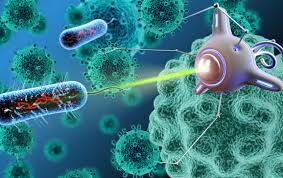
What is nanotechnology? Future Nanotechnology is a vague, overly broad term. The most commonly accepted
definition is something like “nanotechnology is any technology making use of the unique properties of matter
structured on length scales smaller than 100 nm.” By this definition the semiconductor industry has been doing
nanotechnology for a long time now. The point is, in the last ten to twenty years, we’ve learned a lot about how
to engineer materials and structure them in all three dimensions (under the right circumstances) on scales much
smaller than 100 nm. This capability has a real chance of having a major impact on a large number of industries,
from biomedical sensing and treatment to light strong structural composites to energy generation to waste
remediation
What should I study if I’m interested in nanotechnology? Nanoscale science and engineering is broad and
interdisciplinary. The main avenues for getting into cutting edge work at these scales remain condensed matter
physics, physical chemistry, and electrical engineering programs, though there are exceptionally good people
working at the nanoscale in bio, bioengineering, chemical engineering, and mechanical engineering programs
as well. The best approach, in my opinion, is to get a first-rate education in one of these traditional disciplines
and focus on the nano, if you want to make scientific or engineering research contributions. Broad nano
overview programs right now are better suited to people who want to be scientifically literate for decisionmaking (e.g. managers or patent lawyers) rather than those who want to do the science and engineering.
Is there really substance behind the hype? Is nanotechnology actually going somewhere? There is definitely
substance behind some of the hype. As a very recent example, this new paper in Nature Nanotechnology
reports a way of making lithium ion battery electrodes from silicon nanowires. Because it’s in nanowire form, the
Si can take up huge amounts of Li without the resulting strain pulverizing the Si. Between that and the huge
specific surface area of the nanowires, real gains over conventional batteries should be possible. Best of all,
industrial scaleup of Si nanowire growth looks achievable.
That’s just one example from the past week. There is an awful lot of silliness out there, too, however. We’re not
going to have nanorobots swimming through our bodies repairing our capillaries. We’re not going to have selfreproducing nanomachines assembling rocket engines one atom at a time out of single-crystal diamond.
Getting a real science or engineering education gives you the critical skills and knowledge to tell the difference between credible and incredible claims.
Is going into nanotechnology a stable career path relative to alternatives? Another reason to get a solid
education in a traditional science or engineering discipline is that you shouldn’t be limited to just “nano” stuff.
Frankly, I think this would be far more useful in just about any career path (including law or medicine) than an
undergrad degree in business. Still, there are no guarantees – learn to be flexible, learn to think critically, and
learn to solve problems
